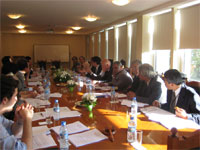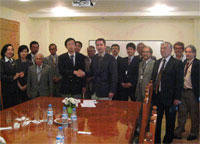“Make the People a Part of the Solution” and the 2nd session of the IPRED
Istanbul on 6-7 July 2009

- © UNESCO/T. Imamura
The UNESCO-IPRED (International Platform for Reducing Earthquake Disasters) Workshop on “Make the Citizens a Part of the Solution” was held on 6-7 July 2009 hosted by the Istanbul Technical University (ITU) and supported by UNESCO and the Japan International Cooperation Agency (JICA).
This Workshop was organized as part of the decennial memorial of the earthquakes which occurred on 17 August 1999 in Kocaeli and 12 November 1999 in Düzce. On this occasion, the second session of the IPRED was also held at the venue.
The Workshop was attended by high level officials of the local authorities as well as by Turkish scientists mainly from the ITU and representatives of nine other earthquake-prone countries (Chile, Egypt, Indonesia, Italy, Japan, Kazakhstan, Mexico, Peru and Romania). Representatives from UN-OCHA, JICA Turkey Office and UNESCO made presentations on their activities related to earthquake disasters.
The Workshop considered the responsibilities of local authorities and community leaders such as governors, mayors and other administrators as the city of Istanbul and its vicinity is recognized by the international community as one of those mega settlements where the safety of critical infrastructures such as hospitals, schools, etc. as well as residential buildings should be ensured as a top priority. Efforts must be pursued so that all realistic measures are taken in order to realize more resilient communities.
The Workshop highlighted the importance of coordinating initiatives towards public preparedness and rehabilitation of existing buildings. These initiatives are under the supervision of national institutions or authorities which shall work for the strengthening of the enforcement system of mandatory building codes, protecting critical facilities such as schools, hospitals and historic buildings, and promoting the development of more affordable retrofitting techniques and the use of available seismic isolation or energy dissipation techniques. One of the main outcomes of this Workshop was the “declaration” including several recommendations to the governments regarding all these matters.

The second session of the IPRED which was held after the Workshop, offered the opportunity to IPRED members (Chile, Egypt, Indonesia, Japan, Kazakhstan, Mexico, Peru, Romania and Turkey) of sharing and reviewing the report of the first session of the IPRED. Subsequently, IPRED members stressed on the contribution of the IPRED to the next International Strategy for Disaster Reduction (ISDR) World Campaign 2010-2011 on “Urban Risk Reduction,” including the establishment of an “ISDR thematic platform on building codes implementation.” The identification of focal point institutions or authorities in every single country was highlighted as priority in order to continue research studies on building codes development and implementation.
During the meeting, IPRED members express their willingness to collaborate and contribute in the revision of the “IAEE Guidelines for Earthquake Resistant Non-engineered Construction.” The participation of El Salvador within the International Platform was discussed and approved during this session. To conclude, an agreement concerning cooperative research and development in the field of earthquake engineering between the Building Research Institute (BRI) of Japan and the National Center for Seismic Risk Reduction (NCSRR) of Romania was signed.
Related links:
:: Declaration [.pdf]
- Source:UNESCO SC
- 18-07-2009
- © UNESCO/T. Imamura -

